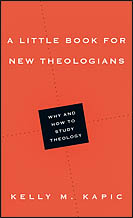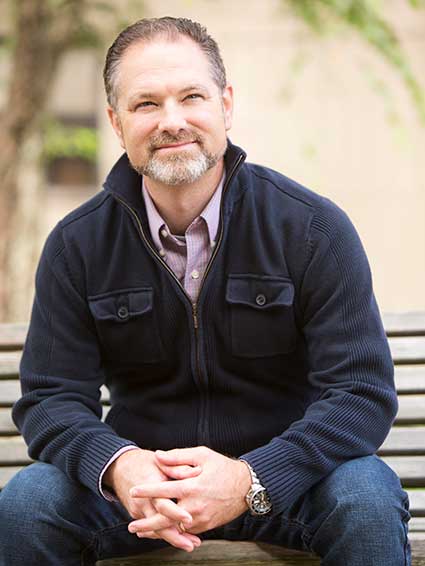Today we conclude our very helpful discussion with Dr. Kelly Kapic (professor of theological studies at Covenant College in Lookout Mountain, Georgia) concerning his A Little Book for New Theologians. If you missed our previous two conversations, you can catch up here (part 1) and here (part 2).
Books At a Glance (Fred Zaspel):
With very uncommon emphasis you point out that knowing God and doing theology necessarily entail a response of compassion toward others in suffering or need — another dimension of “anthroposensitive” theology. Please explain this connection. How is knowing God related to helping others?
Kelly Kapic:
When I was working on the book God So Loved He Gave, one of the things I did was to go from Genesis through Revelation trying to understand what divine generosity looks like. It seemed to me such ‘generosity’ could provide a fresh and informative way to understand God’s grace. Well, it certainly did that for me. And one of the shocking things I discovered in my study is the unbelievable amount of biblical material that shows God’s deep and abiding concern not only for injustice in general, but the poor in particular.
While this could take us into a much longer conversation, I mention that here simply to say that in this study I was also struck by how often ‘knowing God’ was tied together with the poor, with widows, with issues of justice and compassion. I started to realize that we have a massive blind spot when it comes to our theology. It is not that many of us will say ‘the poor’ don’t matter, but at best we think of such things as social concerns, but not theological matters. But this is simply not the case biblically.
Given how controversial such observations can be for some people, I will need to point readers to the book to see the argument unfolded there. But for now, here are a few things I mention there that I assume to be true.
Biblical knowing includes but also goes beyond the acquisition of information. It is emphatically and deeply relational. And, when we come to the question of knowing God, the Bible plunges us into caring for those he cares for, and thus into living with a concrete concern for the poor, the weak and those who suffer (e.g., Jer. 22:16, all of 1 Jn).
Part of the reason I think this must be brought out in a prolegomena to theological method is because I do believe that not only does our theology influence our lives, but our lives influence our theology. And scripture seems to show that when we neglect the poor and oppressed, this not only corrupts our lives but it subtly yet profoundly perverts our theology (e.g., Is 1 and Is 58). But when we are engaged with the needy we can be protected from forgetting that we ourselves are the needy, the vulnerable, the weak, and in this way our theology more ably reflects the heart of our Heavenly Father.

Books At a Glance:
We conservative types tend to think in terms of “my Bible and me.” On the one hand, this seems to reflect our cherished ideal of sola Scriptura, but how might this thinking be mistaken or even misleading and harmful?
Kelly Kapic:
It should go without saying that the Bible is a big book. And on our own, we can make it say just about anything we want. In fact, even holding to a high view of Scripture (e.g., inerrancy) is not sufficient, as for example we recognize that Jehovah Witnesses affirm ‘inerrancy’ and yet represent a grievous theological heresy.
So, I strongly affirm sola Scriptura, and a high view of scripture. But God always gives Scripture to us through his people. This means we should read the Bible in light of the voices of the past.
Practically, this means we should grow nervous if we posit theological positions and interpretations that are truly novel. We should grow nervous when we imagine we are reading the Bible and finding things that no one ever has noticed before. We may be right, but we should move forward with utmost caution, humility, and care.
Put differently, we must care more about Pneumatology and Ecclesiology than we often do. The Holy Spirit has never abandoned the Church throughout her history, even through the highs and lows. In light of this, we also must have a more robust doctrine of the Church than we Evangelicals often have. God cares about his people, he guides them, informs them, and provides for them. So, we should not read his word in isolation, for we are part of a much larger story.
Books At a Glance:
What, then, is the role of Scripture in theology, and why? And just how should this nuance our understanding of the answer to the previous question?
Kelly Kapic:
I love what Steve Holmes says on this, which I think captures the point perfectly: “tradition is both what connects us to Scripture and what separates us from it.” We need to be aware of our great debt to tradition and the living Church, without blindly allowing tradition to trump the authority of scripture.
God’s Word is our lamp, our light, and it is always life giving. We need the Church to interpret scripture, but we must never allow the Church to undermine the prophetic power of God’s Word. Put differently, not only does the Church rightly proclaim the word of God, but the word of God also can and does occasionally speak against the Church. One thinks of Bonheoffer’s frustrations here, as he saw the Church try to subtly but shamefully silence the prophetic voice of God’s word. Judgment, consequently, always begins with the household of God.
But I should add, as theologians of the cross, God’s prophetic voice and judgment also always aims at us first. Before we raise or voices and decry the world, we should remember that we ourselves are always exposed before Scripture. Luther warned us long ago against trying to make Scripture say what justifies us, what empowers us, rather than faithfully reflecting the truth of Christ crucified and risen.
Books At a Glance:
Finally, in brief, what is the task of theology?
Kelly Kapic:
At the end of the book, I give what I see is a framework for moving forward in the theological task. Here is what I write there, and what I would like to leave you with here:
“In its most fundamental form, Christian theology is an active response to the revelation of God in Jesus Christ, whereby the believer, in the power of the Holy Spirit, subordinate to the testimonies of the prophets and apostles as recorded in the Scriptures and in communion with the saints, wrestles with and rests in the mysteries of God, his work and his world. This is the way of our pilgrimage. This is the path of living to God.”
Books At a Glance:
Thank you, Dr. Kapic, for taking the time to talk to our readers. And thank you for your good ministry to us. We trust this little book will receive the wide hearing it deserves.
Kelly Kapic:
Thanks for the opportunity to engage with you on this important topic. It has been an honor and privilege. May God encourage us all as we seek to worship him in spirit and truth.
Buy the books

A LITTLE BOOK FOR NEW THEOLOGIANS
